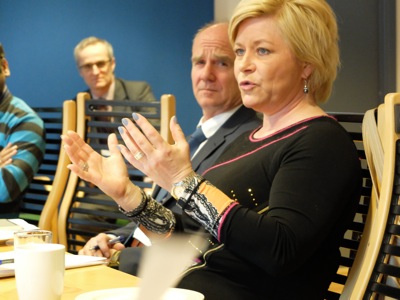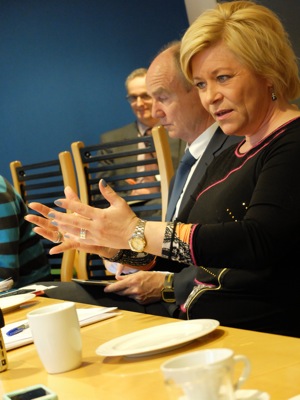Norwegian Finance Minister Siv Jensen rejected criticisms the government’s planned changes to the management of the nation’s massive sovereign wealth fund didn’t go far enough to ensure greener, socially responsible investments, saying the “Oil Fund” is a return-oriented investment scheme, and not an environmental or foreign policy tool. At an international press meeting in Oslo on Monday, the minister and Progress Party leader (Fremskrittspartiet, FrP) also took the opportunity to reflect on how things were tracking for the centre-right coalition since forming government last September.

Jensen delivered a white paper on changes to the oil fund on Friday. The overhaul plans included the effective scrapping of an ethics council (Etikkråd) set up to advise the fund on responsible investments. Decision making power over which companies the fund should invest in or pull out of would be transferred to Norges Bank Investment Management (NBIM), the branch of the central bank responsible for managing the Oil Fund. Consolidating the choice of investments with the management of the fund would strengthen responsible investment, Jensen said.
Criticism quickly emerged over three main areas – that integrating the ethical decision making into NBIM would weaken, not strengthen ethical awareness as the government claimed; that it would reduce transparency and openness; and that the white paper didn’t do enough to move investment out of coal, oil and gas and into climate-friendly resources. There were further concerns over NBIM’s judgment after a controversial investment in an unlisted Formula One racing company.
Jensen’s main point was that while the fund aimed to invest responsibly and encourage companies to be good corporate citizens, it always has to focus first and foremost on investments that give the sovereign wealth fund the best possible return. “There’s always a lot of interest concerning the fund’s investments worldwide, probably naturally enough since it’s a huge sovereign fund, but we stick to the overall strategy,” she said. “It’s a financial fund. This is not an environmental policy tool. It’s not a foreign policy tool. It should invest with one overall perspective, which is return on investments.”
Strengthening ethics
“I have seen that in the past couple of days there has been a certain degree of debate whether we weaken the ethical part of the fund by integrating ethical work into the bank,” said Jensen. She said she believed the integration would in fact strengthen ethics, by keeping decision making at arm’s length from the government and removing any chance the fund could be seen as a political tool.
“That as far as I can see has been the weakness of today’s management, that it has been split in three areas: bank, ministry and the ethical council,” Jensen explained. “Nevertheless, all recommendations made by the ethical council have ended up on the minister’s table, always creating a debate on whether you have taken political steps or not. And to prevent that from being a future debate I think we integrate all means in the bank, would make it more solid also from an ethical perspective.”
Jensen said decisions on ethical guidelines would continue to be made by parliament, and administered by the central bank.
Improving transparency
Jensen said there’s already criticism the current practice isn’t open enough. “I meet with people from all over the world, ambassadors and CEOs and NGOs as well, trying to influence the investment portfolio,” she said. “And I can understand that based on all the different perspectives people might have on trying to attract more money, more of the fund, but it needs to be a very solid and long-term investor with an overall financial perspective.”
“So I think that what we do now by asking the bank to report more, to be more open, to explain their decisions, I think will lead to more openness and it will lead to more debate on exclusion issues,” Jensen went on. “Exclusion is the last resort, the way I see it. I think the best way for the fund to have an impact is actually to be able to change companies’ strategy on more ethical awareness. So if you measure the success on the amount of exclusions, or should you measure the success in how many companies you actually manage to change the behaviour. I believe the latter, and I think that’s why I think it’s important for us to stress more openness as well.”
Controversy arose last month when it emerged the fund had invested NOK 1.8 billion in an unlisted company that controls the rights to Formula One racing, based in a tax haven, headed by a man facing corruption charges. Jensen said she’s not concerned with the judgment of those managing the fund, or giving them more power.
“If you look into the history of the fund, we have had a continuous improvement of management, the investment portfolio, we’ve introduced new ethical standards over the last 10 years so it’s always an ongoing improvement,” she said. Jensen was confident the expert panel set up to report on the work done by the bank would strengthen the openness and public debates.

Responsible investment
Environment groups were disappointed the fund didn’t include more investment in green infrastructure. Jensen said the government is looking at making the portfolio more active, but it’s a question that will be returned to next year. “From the NGOs perspective, I understand why they push for a larger part in greener investments and so forth, but we will never leave the overall strategy, and it will be an overall strategy no matter whether you’re going to greener companies or other types of companies,” she said.
Jensen said more needs to be learned about certain types of investments, for instance real estate, before jumping further into infrastructure. “It’s like we hurry slowly, when we make decisions on behalf of the fund, and that has to do with the fact that it’s so big. It affects markets, so I believe that we have to be very thorough and have a long-term perspective, and we need to be very sharp on the decisions that we end up making.”
As part of the changes, an expert panel was announced to investigate divesting the fund out of oil and coal stocks, but there were criticisms its mandate was too fuzzy. “Those who have criticized the mandate and even the members of the expert panel are the same groups that actually should be very happy about the fact that we have put down this expert group.” She said the panel was due to report in autumn. “Then we will have a public hearing which will end up I guess with a lot of public debate, before the government concludes and puts our recommendations in the white paper for next year.” Jensen said the government would also speed up research and development on climate change.
Jensen’s own sister, Nina Jensen, heads the WWF in Norway. She was among those disappointed the government had broken its promise to use the fund as a means helping to halt climate change. “I did have dinner with my sister yesterday, and it was a nice dinner,” said Jensen.
Minority government tracking well
Several months after the September election, Jensen said she had happily adjusted from opposition to government. “All politicians find it intriguing to be able to do what they believe is better, instead of just saying it, and that’s the difference from opposition to position,” she said. “So it’s good, it’s fantastic, it’s a gift to be able to do this. I mean it’s hard work, and it’s a lot of responsibility, but it is a gift.”
Jensen said the maneuvering needed as a minority government made the job harder, but there were no plans to secure some of the smaller parties as government partners. “What we have said the whole time is that if they want to join, just let us know and then we will sit down and negotiate again,” she said. “So there is an open invitation. But at this point they have signaled that they’re quite happy with the ongoing situation.”
“But I think also, the normality for Norway is to have a minority government,” she continued. “But we’ve had a majority government for the last eight years, and going back to a situation with a minority government, it’s good in many ways because it keeps you on your toes, and it moves focus back to parliament.”
newsinenglish.no/Emily Woodgate

